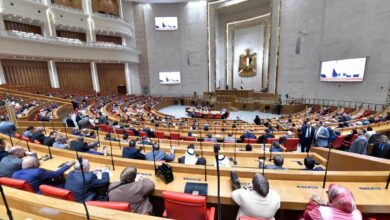The resignation of Prime Minister Ahmed Shafiq on Thursday and his replacement by former transport minister Essam Sharaf was hailed by opposition leaders as a positive step by Egypt’s Supreme Council of the Armed Forces, which has run the nation’s affairs since the 11 February ouster of longstanding president Hosni Mubarak.
Shafiq, appointed by Mubarak in the latter’s final days in office, had been widely rejected by the popular opposition, who saw Shafiq as a remnant of the ancient regime. A million-man protest had been planned for Friday in Tahrir Square to demand his resignation.
An aide to Shafiq who asked not to be identified told Reuters that Sharaf’s appointment as prime minister had been timed to diffuse calls for the million-man rally after a modest cabinet reshuffle last week by Shafiq failed to mollify protesters.
"This is a shocking and premature resignation. There have been pressures from the streets that he quit," the aide was quoted as saying by Reuters.
Ayman Nour, founder of the liberal opposition Al-Ghad Party, welcomed Shafiq’s resignation, describing it as a “good step” towards implementing the people’s demands and putting an end to the Mubarak era.
“I expect there will be a change within the new cabinet with the removal of the justice and interior ministers, and that the new prime minister will dissolve State Security as an entity and restore security, which has disappeared, to the nation,” Nour told Al-Masry Al-Youm.
On Twitter, reform campaigner Mohamed ElBaradei expressed appreciation for the military council for accepting Shafiq’s resignation. ElBaradei had called on Shafiq to resign after armed thugs attacked pro-democracy protesters in Tahrir Square on 2 January in one of several attempts by the regime to crush the uprising.
"Remnants of the old regime leading the transition to democracy is an oxymoron. Enough of this farce! Egypt deserves better,” ElBaradei tweeted.
Sharaf, meanwhile, has been welcomed by many opposition groups since he appears to have few associations with the old regime and had expressed support for the uprising early on.
Hamdeen Sabbahy, head of the opposition Al-Karama Party, told Al-Masry Al-Youm that the newly-appointed PM “represented the Egyptian revolution and not Mubarak,” noting that Sharaf himself had taken part in the uprising.
“The resignation of Shafiq and the appointment of a new prime minister indicates the success of the Egyptian revolution and reduces fears of a counter-revolution,” said Sabbahy.
The Muslim Brotherhood, meanwhile, has said in a statement to the German News Agency that it would “wait and see” how Sharaf would perform before passing judgment on him.
Sharaf served as minister of transport from July 2004 until December 2005, at a time when Shafiq served as minister of civil aviation. Sharaf returned to academia in 2006 as a professor at Cairo University after his resignation as minister following a deadly train accident.




